|
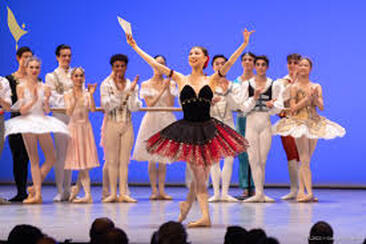 Prix de Lausanne 50th Anniversary Click here to watch The prestigious Prix de Lausanne has been a launchpad toward international renown for talented young dancers since its founding in 1973, helping jumpstart the careers of ballet stars like Nancy Raffa, Darcey Bussell, Carlos Acosta, and Maria Kochetkova. To mark this important milestone, former laureates of the competition returned for a star-studded selection of beloved numbers, featuring favorite moments from classics as well as contemporary pieces by David Dawson, Katarzyna Kozielska, and Christopher Wheeldon. This is a truly spectacular gala. It could easily be titled ‘Ballet’s Best Bits’ because they’re all here – pas de deux from Swan Lake, Nutcracker, Don Quixote, The Dream, and the Dying Swan. There are several less familiar works by contemporary choreographers and the dancing throughout is spectacular. My favourite – look out for it – is a solo by Steven MacRae of a Hungarian Czadas which just takes the breath away. Dancers include Alina Cojocaru,Vadim Muntagirov Marcelino Sambé Francesca Hayward, Steven McRae, Matthew Ball, Laura Fernandez, Xander Parish, Julian MacKay. Madison Young, Marcelo Gomes, Olga Smirnova, and Maria Kochetkova. Heaven for any ballet lover. 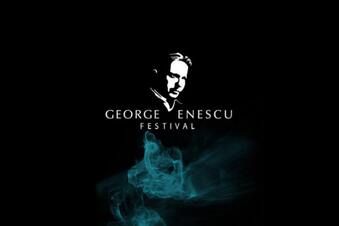 World in Harmony - Enescu International Festival Click Here to Watch From its first edition in 1958 that saw such luminaries as Nadia Boulanger, Claudio Arrau, and Sir John Barbirolli in attendance, the George Enescu International Festival and Competition has regularly attracted the biggest names in classical music from all over the world to Bucharest (Yuja Wang calls it "a must” for every orchestra). Enescu was a master of multiple instruments, teacher of Yehudi Menuhin and Ivry Gitlis, and renowned composer. He was a champion of contemporary music, and his legacy is reflected in the choice of works at the festival. This documentary takes us backstage at the 2019 edition—the first to unfold internationally in cities outside of Bucharest, including Montreal, Berlin, and Florence—where Mitsuko Uchida, Evgeny Kissin, Fabio Luisi, Vladimir Jurowski, Elisabeth Leonskaja, and more of today’s most important musicians discuss Enescu and the festival that bears his name. The Enescu Festival’s commitment to a utopian vision of music and education as forces for unity and peace is beautifully evoked by Joyce DiDonato: “[The festival] gives a chance to gather and have a communal experience around the great themes of life and the great themes of humanity... It’s a beautiful statement by a culture to say, ‘this is something we value, this is something that makes us better as a society and as a culture because it connects us to our humanity in a deep way.’” 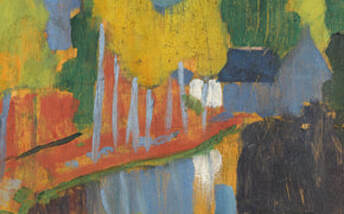 After Impressionism – National Gallery Click Here to Watch This week London’s National Gallery is opening an exhibition called 'After Impressionism: Inventing Modern Art'. It invites us to “Meet the pioneers of modern art From Klimt to Picasso, Van Gogh to Matisse, see the work of more than 50 artists who broke tradition and shattered convention, when our new exhibition opens this week.” It's very rare to see a trailer for anything that one wishes were longer but this one, produced by the National Gallery, is just a beautfiully made and edited snippet of what ought to be a much longer film. I’m hoping the success of this exhibition will encourage them to make one. In the meantime, here’s the trailer. 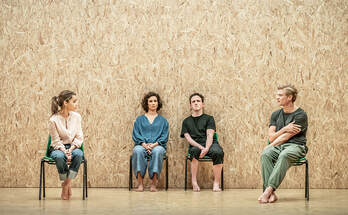 The Seagull – National Theatre Click here for tickets London critics were sharply divided when this new production of Anton Chekhov’s classic premiered at the National last year. Four-star reviews for the stripped-back production by director Jamie Lloyd – modern dress, cast on-stage throughout, no sets - vied with the two-stars of reviewers who found it static and uncharismatic, more like a radio play than a fully staged production. The director’s intention to propel The Seagull into the 21st century by taking away all the usual theatrical props of period details is a matter of personal observation. Does it work? You decide. It is certainly defensible to define The Seagull as a radical play. After all, it always has been. Chekhov wrote the play in 1895 and its first production the following year in Petersburg was a famous failure. Booed at its premiere, it was only when Stanislavski and his fledgling Moscow Art Theatre revived it in 1898 was it recognised as “one of the greatest events in the history of Russian theatre and one of the greatest new developments in the history of world drama”. Chekhov was somewhat surprised that Stanislavski saw it as a tragedy but mollified when The Seagull became a hit beyond his wildest dreams. Before the first production Chekhov wrote, “It's a comedy, there are three women's parts, six men's, four acts, landscapes (view over a lake); a great deal of conversation about literature, little action, tons of love.” It's that “little action” that Jamie Lloyd has followed in directing this production. Emilia Clarke, known for her starring role in TV’s Game of Thrones makes an impressive West End debut as Nina, alongside the strong febrile Arcadina of Indira Varma. An excellent cast, clad only in Chekhov's words, does convey the strength of his characters as well as the action, albeit off-stage, that drives the drama. 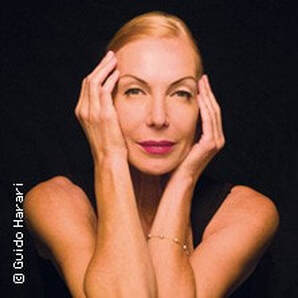 Ute Lemper – All That Jazz Click here to watch I've got a soft spot for the great German cabaret singer Ute Lemper. She appeared at 54 Below in New York this week and although one of her performances was livestreamed, it was streamed only once, at the time of the live performance. That was 7pm NY time with no repeats so it was, with a start time of midnight everywhere in Europe and beyond, not really practical for the rest of us. Instead, especially if you are not familiar with La Lemper, here she is with a tongue-in-cheek performance of a Kander and Ebb song from their musical, Chicago, which she has starred in several times in several languages. It was filmed on a New York rooftop. Back to that soft spot. Lemper is the real thing – a genuine international chanteuse with all the glamour and pizzazz of her spiritual predecessor but with one additional and hugely important asset that Marlene Dietrich didn’t have – a sense of humour. She can interpret a lyric with elegance and wit. She can sing the sexiest songs in the most suggestive manner, just as Marlene did, but she makes sure that you ‘get it’, that you know that she knows that all this exagerated 'attitude' is just for fun.
0 Comments
|
AuthorRuth Leon is a writer and critic specialising in music and theatre. Archives
March 2024
Categories
All
|
 RSS Feed
RSS Feed
